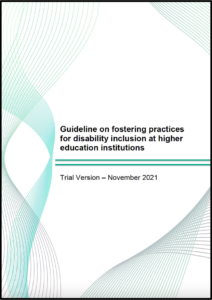Table of Content of the Guideline on fostering practices for disability inclusion at higher education institutions
This Guideline is a compilation of recommended practices that promote an accessible and inclusive teaching and learning environment for students with disabilities at higher education institutions. Sources of data included a review of websites of 76 local and international higher education institutions, focus group interviews, external review, as well as research team members’ input. The recommended practices cut across the cultural, policy, community, inter-university, intra-university, environmental, language and symbolic, technological, interpersonal, and individual levels. The recommended practices also correspond to different stages of higher education from students’ perspectives. This project is funded by the HKU Teaching Development Grant (2019-2022).

Chapters 1-2: Project background and guiding principles
- 1.1 Objectives
- 1.2 Methodology
- 1.3 Target audience
- 1.4 How to read this Guideline?
- 2.1 Co-creating an inclusive culture
- 2.2 United Nations Convention on the Rights of Persons with Disabilities
- 2.3 Disability Discrimination Ordinance
- 2.4 Reasonable accommodation and Unjustifiable hardship
- 2.5 United Nations Sustainable Development Goals
- 2.6 Universal design for teaching and learning
- 2.7 As a context of whole-person development
- 2.8 As a context of positive wellbeing
Chapters 3-8: Essential practices of the co-creation and management of an accessible and inclusive campus at different ecological levels
- 3.1 Recommended structure of accessibility service management
- 3.2 Institution-community network
- 3.3 Cross-institutional network
- 4.1 Recommended Statement of Accessibility Policy
- 4.2 Accessibility Services Advisory Committee
- 4.3 Office of Accessibility Services
- 4.4 Equal Opportunities Advisors
- 4.5 Student Alliance for Inclusion
- 4.6 Staff Alliance for Inclusion
- 4.7 Roles, rights and responsibilities
Chapter 5: Campus environment accessibility
- 5.1 Physical environment
- 5.2 Emergency evacuation
- 5.3 Accessible transportation
- 5.4 Web and multimedia accessibility
- 5.5 Inclusive terminology
- Summary table: Examples of preferred terminology
- 5.6 Symbols of accessibility
- 6.1 Overall approaches
- 6.2 Staff development
- 6.3 Student development
- 6.4 Message framing in inclusion-promoting programmes and materials
- 7.1 Basic principles
- 7.2 General tips on how to interact with persons with disabilities
- 7.3 When meeting people with visual impairment
- 7.4 When meeting people with visual impairment with a guide dog
- 7.5 When meeting deaf or hard of hearing people
- 7.6 When meeting people with mobility disability
- 7.7 Multiple communication means
- 7.8 Disability representation in images
- 8.1 Essential domains to be considered
- 8.2 Prize-giving ceremony as an illustration
Chapters 9-16: Stages of higher education
- 9.1 Information sessions for prospective students
- 9.2 University programmes admission systems
- 9.3 Selection interview
- 9.4 Offer announcement
- 9.5 Reporting and registration day
- 10.1 Basic principles
- 10.2 Initiation registration and service activation
- 10.3 Long-term request of a regular set of services
- 10.4 Short-term request of services
- 10.5 Immediate request of certain equipment and/or services
- 10.6 Requests in response to urgent and emergency situations
- 10.7 Request on behalf of students and staff with disabilities
- 10.8 Request by exchange students with disabilities
- 11.1 Supported transition programmes and orienteering
- 11.2 College enrollment
- 11.3 Orientation camps
- 11.4 Inauguration ceremony and White Coat Ceremony
- 12.1 Campus orienteering
- 12.2 Student hostel
- 12.3 Conveniences
- 13.1 Financial aids
- 13.2 Participation in university affairs and student societies
- 13.3 Participation in cultural life, recreation, leisure and sport
Chapter 14: Academic support
- 15.1 Career counselling
- 15.2 Promoting inclusive internship opportunities
- 15.3 Partnership establishment
- 15.4 Work experience sharing by alumni
- 15.5 Post-graduation career support
- 15.6 Useful resources
- 16.1 Flexibility in study period
- 16.2 Graduation ceremony and the official “photo-taking day”
Suggested citation
- Ma, G. Y. K., Chan, B. L. F., Wu, F. K. Y., Ng, S. T. M., Ip, E. C. L., & Yeung, P. P. S. (2021). Enhancing Learning Experience for Students with Visual Impairment in Higher Education. Guideline on fostering practices for disability inclusion at higher education institutions. (Trial ed.). The University of Hong Kong. (146 pages.). https://doi.org/10.25442/hku.17032685